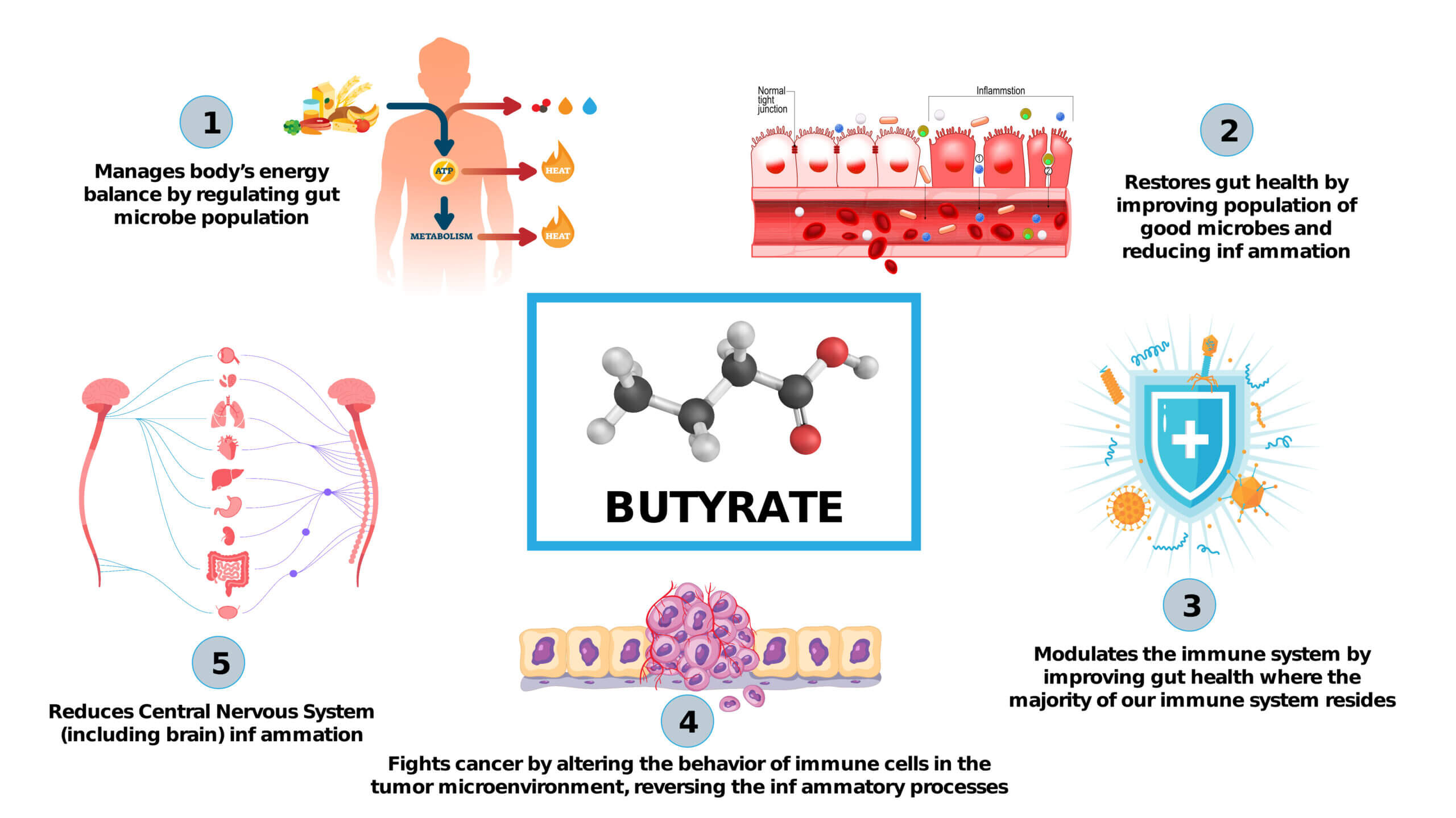Being diagnosed with cancer is overwhelming. Although we all know it’s a possibility we might face one day, we all hope that it won’t touch our lives or the lives of our loved ones. Yet when this fear becomes a reality, it’s crucial to gather every tool and resource we can to confront it head-on. Given that less than 5% of cancers are hereditary in nature, that means there are many things we can control in terms of cancer risk, particularly what we eat or drink. The right foods can do more than just prevent illness; they can become key players in the healing process. That’s why it’s crucial to see food not just as daily nutrition but as a vital part of an anti-cancer toolkit.
In recent years, butyrate has started gaining attention in scientific circles for its substantial health benefits. Butyrate is a short-chain fatty acid anion (SCFA) that is produced when the bacteria in our gut digest and ferment fiber. Fiber is found in plant-based foods and is indigestible to us but not to these microbes. In fact, our gut bacteria thrive on fiber, breaking it down and producing butyrate as a by-product. This butyrate is then used as a primary energy source by the cells in our colon.
Consuming plants and fiber creates a positive feedback loop: the more fiber and plant-based foods you consume, the more beneficial bacteria live in your gut, and the more butyrate and other SCFAs are produced. Consequently, the cells in your colon become healthier and more robust. Although we’ve known about the existence of butyrate for over a century, only in the last two decades have we started to learn about its wide-ranging health benefits, extending far beyond the gut and playing an important role in various body systems.
Read on to discover four organ systems positively impacted by butyrate and how these can benefit individuals with cancer.
Digestive System
Given the fact that butyrate originates in the gut, the digestive system naturally reaps many benefits from this compound. Butyrate is crucial in maintaining the integrity of the gut lining, playing a pivotal role in preventing conditions like leaky gut syndrome (1). When the gut lining remains intact, it prevents the escape of undigested food particles into the bloodstream, averting potential inflammation and a cascade of related health issues.
Butyrate also serves as vital nourishment for colon cells, ensuring they stay healthy and function optimally. While this may seem like a minor detail, its impact is far-reaching. First, butyrate has been linked to a reduction in gastrointestinal side effects commonly associated with conventional cancer treatments, such as nausea and mucositis (2). Moreover, it plays a significant role in managing conditions like Irritable Bowel Syndrome (IBS), Crohn’s disease, and ulcerative colitis, all of which can increase cancer risk (3). These protective and regulatory effects of butyrate contribute to its recognized potential in guarding against colon cancer, underscoring its importance in both digestive health and cancer prevention (4).
Immune System
Some of the most exciting benefits of butyrate are seen in relation to the immune system. In many ways, this isn’t surprising because 70% of the immune system is located in the gut, and most of the interventions that benefit the gut also benefit the immune system (5). Multiple studies have shown that butyrate modulates inflammation and the immune system. More specifically, it appears to positively regulate how and where immune cells travel within the body and how they interact with other cells or tissues (1).
The downstream effects of butyrate’s impact on the immune system are seen in many ways. It has been shown to induce apoptosis (cell death) in cancer cells and prevent metastasis (1). Plus, it appears that butyrate enhances the effectiveness of conventional cancer treatments. For example, studies have shown that butyrate increases the effectiveness of radiation therapy by enhancing the sensitivity of cancer cells to radiation; this allows for potentially lower doses of radiation to be used while sparing healthy tissue and reducing side effects (6). Additionally, other studies have shown that butyrate increases the effectiveness of several different types of chemotherapy, such as irinotecan and 5-fluorouracil (7). Thus, if conventional treatments are deemed necessary, it’s important to have knowledgeable nutritionists working with you who recognize the role of substances like butyrate on your immune system and overall healing journey.
Neurological System
The gut-brain axis is a communication network that links the gut and the brain, allowing them to send signals to each other. For this reason, butyrate has been shown to help our brain in several ways: it reduces brain inflammation, which can slow down or prevent damage linked to diseases like Alzheimer’s and Parkinson’s (8). In addition, just as butyrate helps the cells of the colon, it also appears to help and provide energy to the cells of the brain, thereby improving memory and learning (8).
In research, butyrate has also been shown to improve mood, stress, anxiety, and depression. This is especially important because cancer and mental health disorders are inextricably linked due to the high levels of stress and uncertainty a cancer diagnosis brings. For example, people with cancer are 2.7 times more likely to experience anxiety compared to the general population, and up to 24% of patients with cancer are clinically depressed (9, 10). But butyrate can help! Studies have shown that butyrate can alleviate symptoms of depression and decrease both stress and anxiety (8, 11).
Metabolic System
Butyrate plays a key role in managing the body’s energy and keeping the gut healthy, and it helps regulate the body’s overall energy balance through the action of gut microbes. Research shows that lower butyrate production is linked to metabolic diseases like diabetes, and studies have found that people with diabetes and obesity often have fewer butyrate-producing bacteria in their guts (12). However, many studies show that adding butyrate to the diet can help reduce inflammation, improve how the body uses sugar, and aid in weight loss (12).
More broadly, adopting a diet rich in fruits, vegetables, and fiber is key to maintaining a healthy weight and reducing cancer risk. Numerous studies support the idea that an increased intake of plant-based foods and fiber significantly lowers the likelihood of cancer and other chronic diseases (1). This is true for many reasons, not least because of butyrate. Plant-based foods are also full of anti-cancer phytochemicals like Glucosinolates and carotenoids, and their consumption helps prevent obesity, which is an inflammatory, pro-cancer condition. Alarmingly, the majority of us fail to meet our daily plant-based food needs, with only 1 in 20 people in the US consuming the recommended amount of fiber (13). Thus, embracing a diet rich in plant-based foods not only fosters butyrate production, which is beneficial for metabolic health but also equips the body with essential nutrients to prevent and fight cancer. For more information about how specific plant-based foods have been shown to fight conditions like breast cancer, refer to our past blog article: Breast Cancer and the Microbiome: Part 2.
Butyrate and Intra-Tumoral Metabolism
Among the SCFAs, butyrate has received particular attention for its cancer-fighting properties. It helps the body’s immune system recognize and combat cancer cells effectively and enhances the activity of natural killer (NK) cells, which help fight tumors (14). It also alters gene activity (epigenetics) so that immune cells better respond to threats like cancer (15).
Butyrate also plays an important role in the tumor microenvironment (TME), or the area surrounding a tumor, including the surrounding blood vessels, immune cells, signaling molecules, and the extracellular matrix. This environment plays a critical role in how a tumor grows, spreads, and responds to treatments. Butyrate can impact the TME by altering the behavior of immune cells and the production of substances within this environment, potentially making it less conducive for the tumor to thrive. It can induce a process known as autophagy, where cells clean out their damaged parts, and stimulate the production of anti-inflammatory cytokines, which can reduce inflammation and inhibit tumor growth (14, 16).
The gut microbiota and the TME are closely linked systems, each affecting one another’s composition and function. When the gut microbiota is unhealthy, possibly due to low production of substances like butyrate, it can negatively impact how well cancer treatments work. This happens because an unhealthy gut microbiota can interfere with the body’s immune response to both the cancer and the treatment (17). Some microbes in the TME might even block the immune system’s ability to fight the cancer, help the cancer resist treatment by changing how drugs work in the body, and produce harmful substances that promote cancer growth and weaken the body’s immune defense, leading to less effective cancer treatments (15, 18).
Furthermore, butyrate’s protective role in maintaining the intestinal lining is critical in preventing the transition of harmful microbes from the gut to the tumor site, a process that can exacerbate cancer development. An impaired gut microbiota, marked by insufficient butyrate production, can lead to the disruption of normal immune functions and promote the spread of cancer to distant organs, known as metastasis. Therefore, nurturing a healthy gut microbiome through diet is not just beneficial for digestive health but is also a strategic defense against cancer growth and metastasis (21).
Overall, due to these powerful cancer-fighting properties, butyrate is certainly a strategy worth exploring for patients looking to complement their cancer treatment and enhance their overall healing process!
How To Get Butyrate Naturally
While supplementation can be beneficial, it is not the complete solution to increasing butyrate levels in the body. To truly address the underlying issues, especially those related to metabolic health, it’s essential to identify and tackle the root cause of dysfunction, which often lies in our dietary habits. Supplements should be considered an adjunct to, not a replacement for, a comprehensive dietary strategy that promotes overall health and gut function.
Transitioning to the types of foods that naturally boost butyrate production and focusing on a diet rich in diverse plant-based foods is key. Foods that are high in fiber, such as fruits, vegetables, legumes, and gluten-free grains, are particularly beneficial. Onions, garlic, bananas, chicory root, and leeks are great for stimulating butyrate production. Additionally, incorporating about two tablespoons of ghee daily can be beneficial, as ghee contains butyric acid, a direct source of butyrate. Ghee can be easily integrated into your diet by using it as a cooking oil for sautéing or roasting vegetables or even stirring it into your morning tea for a creamy boost.
References
1. Liu, H., J. Wang, T. He, et al., Butyrate: A Double-Edged Sword for Health? Adv Nutr, 2018. 9(1): p. 21-29.
2. Berni Canani, R., M. Di Costanzo, and L. Leone, The epigenetic effects of butyrate: potential therapeutic implications for clinical practice. Clin Epigenetics, 2012. 4(1): p. 4.
3. Recharla, N., R. Geesala, and X.Z. Shi, Gut Microbial Metabolite Butyrate and Its Therapeutic Role in Inflammatory Bowel Disease: A Literature Review. Nutrients, 2023. 15(10).
4. Hajjar, R., C.S. Richard, and M.M. Santos, The role of butyrate in surgical and oncological outcomes in colorectal cancer. Am J Physiol Gastrointest Liver Physiol, 2021. 320(4): p. G601-G608.
5. Vighi, G., F. Marcucci, L. Sensi, et al., Allergy and the gastrointestinal system. Clin Exp Immunol, 2008. 153 Suppl 1(Suppl 1): p. 3-6.
6. Park, M., J. Kwon, H.J. Shin, et al., Butyrate enhances the efficacy of radiotherapy via FOXO3A in colorectal cancer patient‑derived organoids. Int J Oncol, 2020. 57(6): p. 1307-1318.
7. Kazmierczak-Siedlecka, K., L. Marano, E. Merola, et al., Sodium butyrate in both prevention and supportive treatment of colorectal cancer. Front Cell Infect Microbiol, 2022. 12: p. 1023806.
8. Bourassa, M.W., I. Alim, S.J. Bultman, et al., Butyrate, neuroepigenetics and the gut microbiome: Can a high fiber diet improve brain health? Neurosci Lett, 2016. 625: p. 56-63.
9. Krebber, A.M., L.M. Buffart, G. Kleijn, et al., Prevalence of depression in cancer patients: a meta-analysis of diagnostic interviews and self-report instruments. Psychooncology, 2014. 23(2): p. 121-30.
10. Goerling, U., A. Hinz, U. Koch-Gromus, et al., Prevalence and severity of anxiety in cancer patients: results from a multi-center cohort study in Germany. J Cancer Res Clin Oncol, 2023.
11. Caspani, G., S. Kennedy, J.A. Foster, et al., Gut microbial metabolites in depression: understanding the biochemical mechanisms. Microb Cell, 2019. 6(10): p. 454-481.
12. Peng, K., W. Dong, T. Luo, et al., Butyrate and obesity: Current research status and future prospect. Front Endocrinol (Lausanne), 2023. 14: p. 1098881.
13. Jones, J.M., CODEX-aligned dietary fiber definitions help to bridge the ‘fiber gap’. Nutr J, 2014. 13: p. 34.
14. Khan, M.A.W., G. Ologun, R. Arora, et al., Gut Microbiome Modulates Response to Cancer Immunotherapy. Dig Dis Sci, 2020. 65(3): p. 885-896.
15. Zhao, L.Y., J.X. Mei, G. Yu, et al., Role of the gut microbiota in anticancer therapy: from molecular mechanisms to clinical applications. Signal Transduct Target Ther, 2023. 8(1): p. 201.
16. Azad, M.A.K., M. Sarker, and D. Wan, Immunomodulatory Effects of Probiotics on Cytokine Profiles. Biomed Res Int, 2018. 2018: p. 8063647.
17. Huang, J., W. Liu, W. Kang, et al., Effects of microbiota on anticancer drugs: Current knowledge and potential applications. EBioMedicine, 2022. 83: p. 104197.
18. Iida, N., A. Dzutsev, C.A. Stewart, et al., Commensal bacteria control cancer response to therapy by modulating the tumor microenvironment. Science, 2013. 342(6161): p. 967-70.



